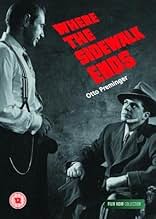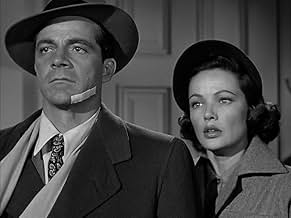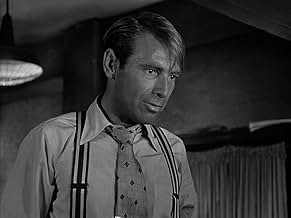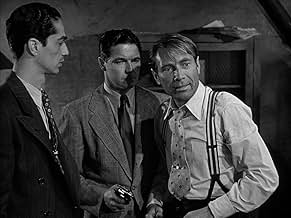NOTE IMDb
7,5/10
11 k
MA NOTE
Mark Dixon veut être quelque chose que son vieil homme n'était pas: un gars du bon côté de la loi.Mark Dixon veut être quelque chose que son vieil homme n'était pas: un gars du bon côté de la loi.Mark Dixon veut être quelque chose que son vieil homme n'était pas: un gars du bon côté de la loi.
- Réalisation
- Scénario
- Casting principal
- Récompenses
- 1 victoire au total
Fred Aldrich
- Detective at Staff Meeting
- (non crédité)
Don Appell
- Willie Bender
- (non crédité)
David Bauer
- Sid Kramer
- (non crédité)
Eddie Borden
- Pool Hall Patron
- (non crédité)
Neville Brand
- Steve
- (non crédité)
Barry Brooks
- Thug
- (non crédité)
Ralph Brooks
- Railroad Baggage Clerk
- (non crédité)
Oleg Cassini
- Oleg
- (non crédité)
John Close
- Hanson
- (non crédité)
Avis à la une
Despite the lack of a haunting theme song and the austere and humourous presence of Clifton Webb, this film is a much more exciting experience than "Laura", the other collaboration between Preminger, Andrews and Tierney. This is one of the grimmest film noir films I've ever seen, and not just in its lurid shadows and rain-drenched streets. The film is dark to its very soul. Dana Andrews plays what is now a standard stereotype: the cop who is bitter and deadly with his temper. But Andrews plays it with more honesty and humanity than most any other angry movie cop you're likely to see. Despite the fact that his character is good at heart, he is also a criminal and a killer, and the film beautifully strings him along, forcing him to serve his spiritual penance. What of course is most fun is the way that his terror over being discovered slowly comes to a boil. I've seen tons of film noir movies but I can't recall ever seeing the protagonist ever becoming the anti-hero in such a startling way. Many of the best film noir pics have that dizzying spiral theme of a man trapped by his own weakness. "Night in the City", "Detour", "Scarlet Street", "In a Lonely Place", "Act of Violence" and "Johnny Eager", are among the best of them. "Were the Sidewalk Ends" holds its own among them. Not a bad recommendation!
If all "film noirs" were this good, we would have a lot more of them. If someone were to ask me what is one I would tell them to go see this movie as a perfect example. This a 50 year old movie that doesn't feel old. In other words, nothing sounds corny and stupid as others of the time. Dana Andrews had a real hard edge on his shoulder much different than in The Best Years Of Our Lives. Without giving anything away, I recommend seeing this movie "cold" like I did and be thoroughly entertained.
At first glance, it would seem natural to compare Where the Sidewalk Ends with Laura. Both have noirish qualities, both were directed by Otto Preminger, and both star Dana Andrews and Gene Tierney. But that's where most of the comparisons end. Laura dealt with posh, sophisticated people with means who just happen to find themselves mixed-up in a murder. Where the Sidewalk Ends is set in a completely different strata. These are people with barely two nickels to rub together who are more accustomed to seeing the underbelly of society than going to fancy dress parties. Where the Sidewalk ends is a gritty film filled with desperate people who solve their problems with their fists or some other weapon. Small-time hoods are a dime-a-dozen and cops routinely beat confessions out of the crooks. Getting caught-up in a murder investigation seems as natural as breathing.
While I haven't seen his entire body of work, based on what I have seen, Dana Andrews gives one of his best performances as the beat-down cop, Det. Sgt. Mark Dixon. He's the kind of cop who is used to roughing up the local hoods if it gets him information or a confession. One night, he goes too far and accidentally kills a man. He does his best to cover it up. But things get complicated when he falls for the dead man's wife, Morgan Taylor (Tierney), whose father becomes suspect number one in the murder case. As Morgan's father means the world to her, Dixon's got to do what he can to clear the old man without implicating himself.
Technically, Where the Sidewalk Ends is outstanding. Besides the terrific performance from Andrews, the movie features the always delightful Tierney. She has a quality that can make even the bleakest of moments seem brighter. The rest of the cast is just as solid with Tom Tully as the wrongly accused father being a real standout. Beyond the acting, the direction, sets, lighting, and cinematography are all top-notch. Overall, it's an amazingly well made film.
If I have one complaint (and admittedly it's a very, very minor quibble) it's that Tierney is almost too perfect for the role and her surroundings. It's a little difficult to believe that a woman like that could find herself mixed-up with some of these unsavory characters. It's not really her fault, it's just the way Tierney comes across. She seems a little too beautiful, polished, and delicate for the part. But, her gentle, kind, trusting nature add a sense of needed realism to her portrayal.
While I haven't seen his entire body of work, based on what I have seen, Dana Andrews gives one of his best performances as the beat-down cop, Det. Sgt. Mark Dixon. He's the kind of cop who is used to roughing up the local hoods if it gets him information or a confession. One night, he goes too far and accidentally kills a man. He does his best to cover it up. But things get complicated when he falls for the dead man's wife, Morgan Taylor (Tierney), whose father becomes suspect number one in the murder case. As Morgan's father means the world to her, Dixon's got to do what he can to clear the old man without implicating himself.
Technically, Where the Sidewalk Ends is outstanding. Besides the terrific performance from Andrews, the movie features the always delightful Tierney. She has a quality that can make even the bleakest of moments seem brighter. The rest of the cast is just as solid with Tom Tully as the wrongly accused father being a real standout. Beyond the acting, the direction, sets, lighting, and cinematography are all top-notch. Overall, it's an amazingly well made film.
If I have one complaint (and admittedly it's a very, very minor quibble) it's that Tierney is almost too perfect for the role and her surroundings. It's a little difficult to believe that a woman like that could find herself mixed-up with some of these unsavory characters. It's not really her fault, it's just the way Tierney comes across. She seems a little too beautiful, polished, and delicate for the part. But, her gentle, kind, trusting nature add a sense of needed realism to her portrayal.
An excellent opening title sequence starts this gritty Noir off in perfect step with what will follow. The son of a thief who was killed while attempting to shoot himself out of jail, Mark Dixon became a cop in an attempt to atone for the sins of the father, but cannot quite escape the fathers blood surging through his veins every time he strikes out at a hood, and it's his excessive use of force that gets him demoted with the threat of losing his job as detective, the only thing he ever wanted out of life. When he accidentally kills a witness to a murder, panic takes hold of him and he proceeds to cover up the evidence, but fate has a way of meting out cruel justice. Mark will fall in love for his victim's ex, and then her innocent uncle through another freak accident ends up taking the rap for the murder when the body turns up. And now the real moment of truth - atone for his own sins and free an innocent man, but probably lose the girl, or say nothing, keep the girl, but end up being just like his father? A brilliantly executed noir by Preminger and Dana Andrews nails one of the best performances of his career as the tormented detective.
Produced and directed by Otto Preminger, and starring Dana Andrews, the king of the B-movies, this is a terrific 20th-Century Fox film noir, all heavy woollen topcoats, stylish wide-brimmed hats and skewed camera angles. It's a film with a superb 'dark' look and a Ben Hecht script which delivers the authentic cadences of noirspeak.
Mark Dixon is a tough cop. His father was a small-time hood, and Dixon feels he has something to prove. He uses street methods, roughing-up bad guys and bullying stoolpigeons. He is not liked by his superiors, and has remained a detective sergeant, whereas his contemporary Lewis (Karl Malden) has played it by the book and has risen to the rank of lieutenant. Lewis is now Dixon's boss, and there is considerable tension between the two men.
Enter Ken Paine (Craig Stevens), a two-bit crook and bagman for Scalise (Guy Merrill). Tall, dark and handsome, and a much-decorated war hero, Paine is a drinker and a punk who lurks around cheap crap games. He is dating a dame by the name of Morgan Taylor (Gene Tierney), a looker with a whiff of glamour about her. Morgan is a fashion model in a Manhattan department store by day, and an 'escort' in Scalise's gambling club by night. Jiggs Taylor, her father (Tom Tulley), is a New York cabbie with a fondness for telling tall stories.
Dixon is on his last chance. The captain has made it clear - no more rough stuff. Then something dreadful happens, and Dixon panics and tries to cover it up. He sets in motion a train of events which he can't control, especially after he becomes emotionally involved with the beautiful Morgan. Dixon's tormented soul is the film's battleground, the instinct for self-preservation warring with a guilty conscience and a need to earn the girl's respect.
Though they do not spoil the movie, there are some things in the story which don't quite add up. A detective openly discusses a current investigation with a yellow cab driver, something which even the unorthodox Dixon would never do. Dishes are served to Dixon and Morgan in the restaurant, even though they didn't order anything specific. How is Morgan able to get to Paine's apartment in the couple of minutes which elapse after she hears the news? Why do the police interrogate Jiggs at the scene, in the presence of his daughter? Surely the detectives know better than to subject Jiggs to a confrontation ID without allowing him access to legal advice?
A 'noir' is nothing if not atmospheric, and this one is dripping with atmosphere. Brooklyn Bridge looms high over the mean streets, a skeletal silhouette which haunts the action like some urban angel of doom. New York City is the matrix in and through which these characters function, the context of their entire existence, and its presence is constantly felt. Whether by means of an el-train overhead, or a forest of skyscrapers swimming into focus through the locker-room window, the city surrounds and bears in upon these people, the malevolent nest through which they are obliged to scurry.
Dana Andrews is excellent as Dixon, the tough guy who retains our sympathy because he is capable of remorse. Watch out for Scalise's masseur, a very young Neville Brand.
It doesn't always help to be innocent, says Dixon, the hard man conscious of the harsh ways of the city, but the wretchedness of a guilty conscience is a terrible burden to bear. The camera conveys this beautifully, with a brooding Dixon large in the foreground as the investigation proceeds, and earlier, his horrified face twisted by a fish-eye lens as he realises the enormity of what he has done.
Verdict - A murky, grim film noir ... marvellous!
Mark Dixon is a tough cop. His father was a small-time hood, and Dixon feels he has something to prove. He uses street methods, roughing-up bad guys and bullying stoolpigeons. He is not liked by his superiors, and has remained a detective sergeant, whereas his contemporary Lewis (Karl Malden) has played it by the book and has risen to the rank of lieutenant. Lewis is now Dixon's boss, and there is considerable tension between the two men.
Enter Ken Paine (Craig Stevens), a two-bit crook and bagman for Scalise (Guy Merrill). Tall, dark and handsome, and a much-decorated war hero, Paine is a drinker and a punk who lurks around cheap crap games. He is dating a dame by the name of Morgan Taylor (Gene Tierney), a looker with a whiff of glamour about her. Morgan is a fashion model in a Manhattan department store by day, and an 'escort' in Scalise's gambling club by night. Jiggs Taylor, her father (Tom Tulley), is a New York cabbie with a fondness for telling tall stories.
Dixon is on his last chance. The captain has made it clear - no more rough stuff. Then something dreadful happens, and Dixon panics and tries to cover it up. He sets in motion a train of events which he can't control, especially after he becomes emotionally involved with the beautiful Morgan. Dixon's tormented soul is the film's battleground, the instinct for self-preservation warring with a guilty conscience and a need to earn the girl's respect.
Though they do not spoil the movie, there are some things in the story which don't quite add up. A detective openly discusses a current investigation with a yellow cab driver, something which even the unorthodox Dixon would never do. Dishes are served to Dixon and Morgan in the restaurant, even though they didn't order anything specific. How is Morgan able to get to Paine's apartment in the couple of minutes which elapse after she hears the news? Why do the police interrogate Jiggs at the scene, in the presence of his daughter? Surely the detectives know better than to subject Jiggs to a confrontation ID without allowing him access to legal advice?
A 'noir' is nothing if not atmospheric, and this one is dripping with atmosphere. Brooklyn Bridge looms high over the mean streets, a skeletal silhouette which haunts the action like some urban angel of doom. New York City is the matrix in and through which these characters function, the context of their entire existence, and its presence is constantly felt. Whether by means of an el-train overhead, or a forest of skyscrapers swimming into focus through the locker-room window, the city surrounds and bears in upon these people, the malevolent nest through which they are obliged to scurry.
Dana Andrews is excellent as Dixon, the tough guy who retains our sympathy because he is capable of remorse. Watch out for Scalise's masseur, a very young Neville Brand.
It doesn't always help to be innocent, says Dixon, the hard man conscious of the harsh ways of the city, but the wretchedness of a guilty conscience is a terrible burden to bear. The camera conveys this beautifully, with a brooding Dixon large in the foreground as the investigation proceeds, and earlier, his horrified face twisted by a fish-eye lens as he realises the enormity of what he has done.
Verdict - A murky, grim film noir ... marvellous!
Le saviez-vous
- AnecdotesThe only feature film appearance for fashion and costume designer Oleg Cassini, who was married to Gene Tierney at the time. They would divorce in 1952. Reportedly, Cassini talked director Otto Preminger into giving him the part.
- GaffesWhen Dixon is staging the murder scene after Ken Paine' death, he is gloveless. A few seconds later he has gloves on both hands.
- Citations
[to Detective Dixon]
Insp. Nicholas Foley: Your job is to detect criminals, not to punish them.
- Crédits fousThe opening credits start as chalk writing on a sidewalk with someone walking over them and whistling.
- ConnexionsFeatured in Gene Tierney: Final Curtain for a Noir Icon (2008)
Meilleurs choix
Connectez-vous pour évaluer et suivre la liste de favoris afin de recevoir des recommandations personnalisées
- How long is Where the Sidewalk Ends?Alimenté par Alexa
Détails
- Date de sortie
- Pays d’origine
- Langue
- Aussi connu sous le nom de
- Al borde del peligro
- Lieux de tournage
- 58 Pike Street, Manhattan, Ville de New York, New York, États-Unis(Ken Paine's apartment - between Madison and Monroe Streets - since demolished. Note Manhattan Bridge in the background)
- Société de production
- Voir plus de crédits d'entreprise sur IMDbPro
Box-office
- Budget
- 1 475 000 $US (estimé)
- Durée
- 1h 35min(95 min)
- Couleur
- Rapport de forme
- 1.37 : 1
Contribuer à cette page
Suggérer une modification ou ajouter du contenu manquant



































